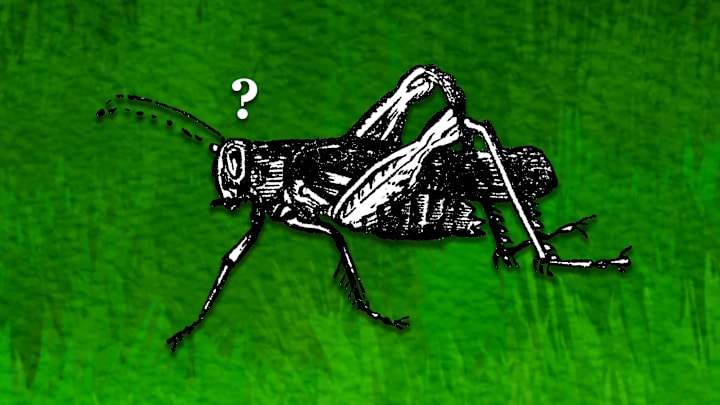What are the sounds of silence? With all due respect to Simon and Garfunkel, the most common answer is “crickets.” This noisy insect has somehow become synonymous with no sound at all.
This sense of the word crickets has yet to make the Oxford English Dictionary (though it surely will eventually). Still, it has plentiful coverage in Merriam-Webster, which added it to the dictionary in September 2023 with the definition “a conspicuous lack of response.” In discussing the term in a “Words We’re Watching” feature—which cites examples going back to the early 2000s—Merriam-Webster describes how crickets originally conveyed a sense of a rural setting:
“Crickets are often used by writers to convey atmosphere or to create a sense of place. That is, not the insects themselves, but rather the sound that crickets make. The chirping of crickets is the sound of nature on a summer night, and it has become a kind of cultural shorthand that indicates much with a single word: the setting is far from the city and far from people.”
The term seems to have evolved from senses indicating a rural setting—which is less noisy than the city by a lot—to any place or stretch of time quiet enough that, in theory, only the sound of crickets could be heard, as in this example from the 2007 novel Agnes and the Hitman: “There was a silence long enough to hear crickets in, and Agnes thought, If he makes some crack about me being not little, I’m gonna hit him again, and then he spoke.”
From there, crickets became a term for silence itself, one clear enough that it can stand alone as its own sentence, functioning as a sound(less) effect in writing. (Movies may have played a role in this: As Merriam-Webster notes, screenwriters have used it as “cinematic shorthand for quiet country locations” in scripts.)
Green’s Dictionary of Slang surprisingly has no examples until 2024, when it records a post on the social media platform Bluesky about a double standard in political coverage: “If Biden had called his wife Jill ‘Joan,’ how much ink would we see about how he’s old, senile + losing it? Yet The Other Guy ... crickets.”
This is typical of how the term is used. When a standup comedian’s joke bombs? Crickets. When a teacher baffles students? Crickets. When a band plays an unknown song instead of one of your favorites? Crickets. Crickets are the patron animal of silent awkwardness, a total non-reaction.
Crickets is a bit of a paradoxical term, as it means or indicates silence, but literally refers to some pretty noisy creatures. According to some sources, crickets can chirp as loudly as 100 decibels, which is about as loud as a snowmobile (a fact you’re likely all too aware of if you’ve ever tried to fall asleep with one trapped in your house). Even the word itself, borrowed from French, imitates the noise the insect makes. Some older, now-obscure expressions reference the boisterousness of the cricket: Lively as a cricket, for example, or merry as a cricket, were used in English as early as the early 1500s. An 1815 use by J. Mathers describes one happy and satisfied fellow: “I slept sound, ate and drank heartily, grew as merry as a cricket and as fat as a porker.”
This led to a sense of cricket meaning “a merry or lively person” from the 1600s on, which is still around in recent times, as seen in a Boston Globe use from 2002: “Her friend and fellow Wellesley Friends Meeting member ... described her as a ‘lively little cricket’.”
So, the cricket can signify merriment and noise or awkwardness and silence. That’s pretty good for a humble little insect.
Discover the Answers to More Big Questions:
